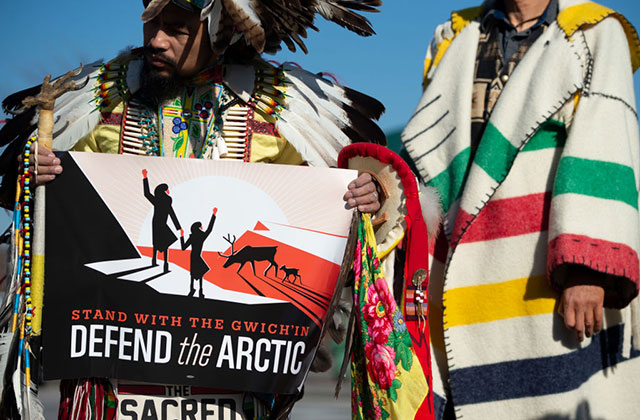Nearly 1.6 million acres of the Arctic National Wildlife Refuge’s 19 million-acre coastal plain in Alaska are at risk of being destroyed for the first time ever, as a result of the Trump Administration’s approval of an oil lease auction today (August 17), the Wall Street Journal reports. This idyllic stretch of land supports a diverse ecosystem of animals and insects, including mammals (caribou, wolves, polar bears), and more than 200 species of birds and fish.
“Congress gave us a very clear directive here, and we have to carry out that directive consistent with the directive that they gave, and consistent with the procedural statutes,” Interior Secretary David Bernhardt told WSJ. “I have a remarkable degree of confidence that this can be done in a way that is responsible, sustainable and environmentally benign.”
In 2017, a Republican-lead Congress and Senate mandated “at least two sales within 10 years” for an oil and gas leasing program. Two years later, once the House of Representatives was back in Democratic control, the Arctic Cultural and Coastal Plain Protection Act was passed to stop the Trump Administration from being able to touch the land. As Congress had given the Department of Interior until December 2021 to sell leases, locking in contracts this year would make reversing course harder for future presidents, the Los Angeles Times reports.
None of this sits well with wilderness advocates. “Our climate is in crisis, oil prices have cratered, and major banks are pulling out of Arctic financing right and left,” Adam Kolton, executive director at Alaska Wilderness League, told USA Today. “And yet the Trump administration continues its race to liquidate our nation’s last great wilderness, putting at risk the Indigenous peoples and iconic wildlife that depend on it.”
The Wilderness Society also released a statement today from Alaska State director Karlin Itchoak, who wrote:
This is likely a bad Record of Decision resulting from a fundamentally flawed Final Environmental Impact Statement that offered only alternatives that would result in destructive, widespread development on the sacred calving grounds of the Porcupine Caribou Herd. The Gwich’in and Iñupiat people who depend on the herd for their survival—and all Americans—deserve better.
This is another outrageous move by an administration that ignores science and shortcuts the public process in an irresponsible rush to help oil companies secure leases on the coastal plain before the 2020 presidential election. This fight is not over. We remain committed to keeping drill rigs out of one of the wildest, most beautiful places in America.
